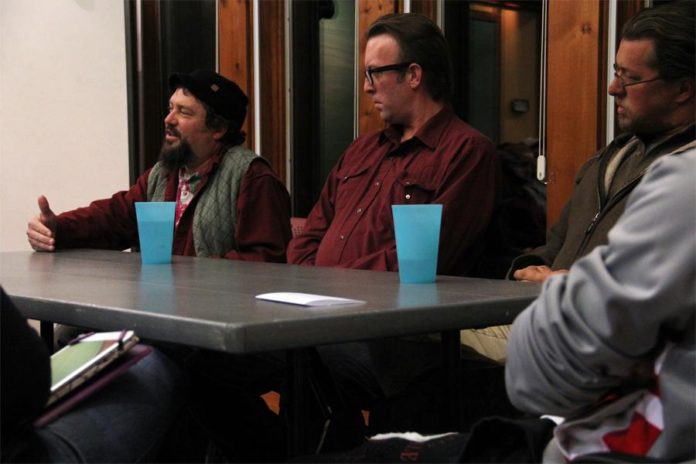When buying groceries, we almost always try to find the best sales. On Tuesday night at the Macoskey Center, a panel of farmers explained how buying organic and local foods helps save time and money.
As the panel started, Eric Rifenberrick, one of the panelist from Pine Run Farm,surveyed students to see how many of them actually knew where their food came from. Most said they had no clue where most of the food in their refrigerators originated.
“It’s very important to know these things. It assures you that your money will be going towards what you paid for. As farmers, it makes us happy when customers get what they paid for,” Rifenberrick said.
The second panelist, Bob McCafferty, runs a business that is a little closer to home. As the owner of the North Country Brewing Co. located on Main Street, McCafferty explained that buying local and organic is very important to not only to consumers but their company as well.
“There is a sense of pride in buying things locally. In our brewery, we get a lot of adults who think that it is awesome that we make our own beer,” he said. “We get people from all over the district who come to taste our drinks. The fact that they don’t have to go far to taste hand-crafted beer saves money.”
Slippery Rock alum, Greg Boulos, was the final panelist to take part in the discussion. Boulos and his wife are the owners of Blackberry Meadows Farm located in Pittsburgh. Boulos expressed that being a part of the Community Supported Agriculture (CSA) program helped him build his business. He explained that CSA is a food based program that was made to create a more direct relationship between the farmer and the consumer.
“My wife and I are members of CSA, so we are forced to talk about this stuff,” he joked. “We’ve had between 16 and 17 years of organic farming experience, so we decided to take a shot at trying to run and own a farm.”
Boulos expressed how growing vegetables and other foods organically has been very useful.
“It’s right there for you. You don’t have to run across town to go pick up vegetables at a grocery store. It’s a lot cheaper and sustainable. We really try to get local college students to talk more about and practice sustainability. It may not seem that important, but it is.”
Along with Boulos, another individual favoring sustainability is professor of business, Dr. John Golden. As an owner of several businesses, Golden knows how important sustainability can be. Golden said there are three big benefits of buying organic and local. Sustainability was at the top of the list.
“If you buy locally, you protect and make the environment more sustainable because you don’t have to truck the food thousands of miles across the country or import it from other countries, which takes a lot of energy. It is a lot better for the climate and region.”
A better community is another benefit that comes from buying locally and organically, Golden said.
“Buying locally stimulates the economy by creating more jobs. I mean, look out the window. We have farms all over. You don’t see auto plants or steel mills out there, so obviously in our neck of the woods, these are the local businesses that we want to support,” Golden explained.
The third benefit of buying local and organic is a healthy lifestyle, he said. Golden explained that most of the time, people don’t know where their food comes from. Sometimes people think they just come from the packages on the shelf. When buying local, you know where and how your food is grown. He also explained that locally grown food has less chemicals and less preservatives, which makes healthier food, resulting in a healthier body.
“This way you will be able to connect more with your food, ” Golden said. “Everyone loves food, so knowing that locally grown food is healthy and delicious is just a win-win in everyone’s eyes.”








